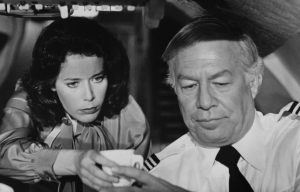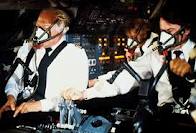
It’s an indelible cinematic image worthy of Bergman — Joe Patroni, that ever-lovable, white-maned, sheepdog of a man, now rendered shirtless, pantless, and cock-to-the-wind by Parisian prostitute Bibi Andersson, makes angry, yet tender, widower love while mere inches from a roaring fire. It helps that there’s enough bearskin to go around, if only to shield our eyes from the magnitude of the event. Yes, that Patroni, the Forrest Gump of aviation; the cigar-chomping, pilot-threatening, fire truck-riding dynamo who rode out each successive storm through a decade of doomed jets in order to at last secure the top job.
Only now, his beloved wife …the very same who damn near married a mountain in 1975’s segment… has passed on, felled by a cancer that forced the character to become a different actress altogether in the intervening years. Patroni is devastated, of course, but his towering manhood won’t allow a full surrender. For wherever there are C-list celebrities needing a harrowing, topsy-turvy ride over a body of water, jagged peak, or volcanic blast, Patroni is there. A bit meaner and not at all leaner, but there. Because wherever there’s a Patroni, there’s an expensive aircraft waiting to come apart at the seams.
Whenever George Harris Kennedy, Jr. appears onscreen, especially in a decade that was never all that kind to character actors, it’s important to remember that somewhere, in the guest bathroom of your choosing, sits an Oscar. His Cool Hand Luke turn was worthy, mind you, but it set the tone for all future GK performances. You see, Kennedy never seemed all that bright. More lug than luminary, he’s more apt to spit in your face and throw you across a table than utter a snippet of coherent dialogue. Even when he’s donning a priest’s collar for Delta Force, we imagine he’s just a murdering rapist in disguise, not an actual man of the cloth.
And while he meant well and cut the mustard as a blue-collar champion, it seemed utterly impossible that he’d have the wits to take the controls himself. Yet here he is, having convinced men far wiser than he that when an American company decided to buy a Concorde and send it to Moscow via the City of Lights, the best man for the job would happen to be the one most likely to have a criminal record. Still, like every pilot worthy of the uniform, he treats women like the grit and grime he used to clean from under his fingernails. That is, before the cockpit became his office.
 There are two flights in Concorde: Airport Â79, and it stands to reason that each is beset with problems that rarely affect entire fleets over the course of decades. The first leg – from Washington, D.C. to Paris  is targeted by Robert Wagner, not only convinced that Natalie Wood is indeed aboard, but that she has few qualms about exposing his greedy, treasonous arms deals with shady, swarthy men of various nationalities. Rather than simply shoot the bitch, or have some transient attack her in a hotel elevator, he spends countless millions (not to mention an enormous amount of chits) to have the plane downed by fighter jets. How he plans to cover this up is not important  then or now because Our Man Kennedy has a plan even more outrageous: he will roll down the cockpit window, damn the airspeed, and shoot a flare gun to divert the heat seekers from their target.
There are two flights in Concorde: Airport Â79, and it stands to reason that each is beset with problems that rarely affect entire fleets over the course of decades. The first leg – from Washington, D.C. to Paris  is targeted by Robert Wagner, not only convinced that Natalie Wood is indeed aboard, but that she has few qualms about exposing his greedy, treasonous arms deals with shady, swarthy men of various nationalities. Rather than simply shoot the bitch, or have some transient attack her in a hotel elevator, he spends countless millions (not to mention an enormous amount of chits) to have the plane downed by fighter jets. How he plans to cover this up is not important  then or now because Our Man Kennedy has a plan even more outrageous: he will roll down the cockpit window, damn the airspeed, and shoot a flare gun to divert the heat seekers from their target.
And if that’s not enough, he sends the sleek airliner into a steep, evasive dive, but only after firing the second flare into the cockpit itself. Now, few can imagine that anyone, even one so reliably masculine as Patroni, could put out a cabin fire while plunging towards the ocean at the speed of sound, but results don’t lie, even if he must be forgiven for getting his hair a bit mussed. The pursuing jet slams into the water, leaving the sea to tell the tale of the fool who dared believe he could outsmart George Kennedy.
The second leg (as if there would ever be such a thing with the exact same plane and pilot) will take our hero from Paris to Moscow, where Cicely Tyson will drop off a heart for her son, while Jimmie Walker plays a sax solo to convince the Soviets to retreat from Afghanistan. Bob Wagner is still lurking about, however, and this time, he’ll resort to the tried and true: bribing a mechanic to set a timer that ensures a cargo door will give way mid-flight. One might wonder how the dirty deed was accomplished, what with two or three mildly disinterested French policemen guarding the jet, but the trap is set, and every last passenger from the first near-death experience will think nothing of climbing aboard once again.
Patroni will be ready as well, as his layover is chock full of orgasmic glee, courtesy of the French co-pilot. Later events will prove how necessary it was to send Patroni into a state of complete relaxation, for it would have been more than understandable for him to take a break after being mere seconds from death. But by sunrise, Patroni would be prepped, powdered, and positively glowing. He’d better be, for, in his words, “We’ve got explosive decompression!” And how!
Pausing only to rescue Eddie Albert from a chasm in the fuselage and hand out pillows, Patroni sheds his useless oxygen mask to affect commercial aviation’s only known quadruple barrel roll at MACH 2. Then, with little by way of perspiration or nervous rattle, he kindly informs the cockpit and hell, the world that he’ll land this supersonic bird on the fucking Alps. Not near them, by them, or with them acting as a stunning backdrop, but ON THEM. Without a runway. Using a mere snowdrift to slow them down. One might remember that on the first leg, the plane barely came to a stop with wheels and brakes and concrete and several rounds of mesh netting, but Patroni, like all men of fire and sky, lives in the now.
The past is for pussies, where dead wives, crying passengers, and burnt husks of metal reside. GK, too flabby by half but defiantly all cheek and jowl, beats that damn mountain, even if the precious plane explodes mere seconds after the last lunatic has disembarked. Wagner, his plot in tatters, commits suicide aboard his own doomed flight. A nation saved, a woman fucked, and a vital organ delivered. All in a day’s work. GK style.
